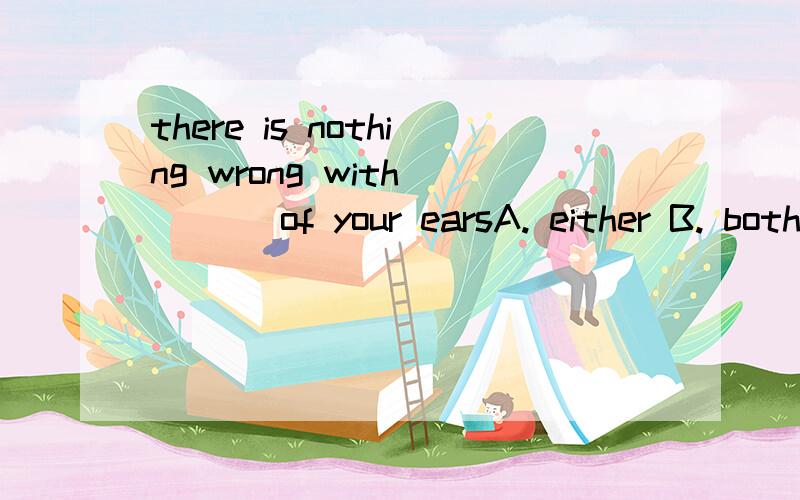there is nothing wrong with ___ of your earsA. either B. both C. neither D. noneеә”иҜҘйҖүе“ӘдёӘ,дёәд»Җд№Ҳ?иҜ·иҜҰз»Ҷи§ЈжһҗдёҖдёӢеҘҪеҗ—?и°ўи°ў!
жқҘжәҗпјҡеӯҰз”ҹдҪңдёҡеё®еҠ©зҪ‘ зј–иҫ‘пјҡдҪңдёҡеё® ж—¶й—ҙпјҡ2024/11/30 00:45:12

there is nothing wrong with ___ of your earsA. either B. both C. neither D. noneеә”иҜҘйҖүе“ӘдёӘ,дёәд»Җд№Ҳ?иҜ·иҜҰз»Ҷи§ЈжһҗдёҖдёӢеҘҪеҗ—?и°ўи°ў!
there is nothing wrong with ___ of your ears
A. either B. both C. neither D. none
еә”иҜҘйҖүе“ӘдёӘ,дёәд»Җд№Ҳ?иҜ·иҜҰз»Ҷи§ЈжһҗдёҖдёӢеҘҪеҗ—?и°ўи°ў!
there is nothing wrong with ___ of your earsA. either B. both C. neither D. noneеә”иҜҘйҖүе“ӘдёӘ,дёәд»Җд№Ҳ?иҜ·иҜҰз»Ҷи§ЈжһҗдёҖдёӢеҘҪеҗ—?и°ўи°ў!
A
еүҚж–ҮжңүдәҶдёӘеҗҰе®ҡиҜҚ nothing,еҰӮжһңйҖүboth ,йӮЈдҫҝжҳҜвҖңйғЁеҲҶеҗҰе®ҡвҖқдәҶ,еҚівҖңдҪ дёҚжҳҜдёӨеҸӘиҖіжңөйғҪжңүй—®йўҳвҖқ.иҷҪиҜӯжі•д№ҹжӯЈзЎ®,дҪҶжҲ‘жғіеә”иҜҘдёҚжҳҜиҜҙиҜқдәәжғіиЎЁиҝ°зҡ„ж„ҸжҖқ.
йҖүeither дёәвҖңе…ЁйғЁеҗҰе®ҡвҖқ,ж„ҸдёәвҖңдҪ зҡ„дёӨеҸӘиҖіжңөйғҪжІЎдәӢвҖқ
A иЎЁзӨәдёӨиҖ…дёӯзҡ„д»»дҪ•дёҖдёӘгҖӮ
дҫӣеҸӮиҖғгҖӮ
йҖүA.
eitherжҢҮдёӨиҖ…д№Ӣдёӯзҡ„д»»дҪ•дёҖдёӘжҲ–жҜҸдёҖдёӘпјҢеҸҜдҪңд»ЈиҜҚгҖҒеҪўе®№иҜҚпјҢдҪңеҪўе®№иҜҚж—¶еҗҺи·ҹеҚ•ж•°еҗҚиҜҚгҖӮдәәжңүдёӨеҸӘиҖіжңөпјҢж•…йҖүA
bothжҢҮдёӨиҖ…йғҪгҖӮгҖӮгҖӮгҖӮгҖӮгҖӮпјҢеҸҜдҪңд»ЈиҜҚгҖҒеҪўе®№иҜҚпјҢдҪңеҪўе®№иҜҚж—¶еҗҺи·ҹеӨҚж•°еҗҚиҜҚгҖӮ
neitherжҢҮдёӨиҖ…зҡ„еҗҰе®ҡпјҢеҸҜдҪңд»ЈиҜҚгҖҒеҪўе®№иҜҚпјҢдҪңеҪўе®№иҜҚж—¶еҗҺи·ҹеҚ•ж•°еҗҚиҜҚгҖӮ
noneжҢҮдёүиҖ…д»ҘдёҠзҡ„еҗҰе®ҡпјҢжҳҜдёӘд»ЈиҜҚгҖӮ...
е…ЁйғЁеұ•ејҖ
йҖүA.
eitherжҢҮдёӨиҖ…д№Ӣдёӯзҡ„д»»дҪ•дёҖдёӘжҲ–жҜҸдёҖдёӘпјҢеҸҜдҪңд»ЈиҜҚгҖҒеҪўе®№иҜҚпјҢдҪңеҪўе®№иҜҚж—¶еҗҺи·ҹеҚ•ж•°еҗҚиҜҚгҖӮдәәжңүдёӨеҸӘиҖіжңөпјҢж•…йҖүA
bothжҢҮдёӨиҖ…йғҪгҖӮгҖӮгҖӮгҖӮгҖӮгҖӮпјҢеҸҜдҪңд»ЈиҜҚгҖҒеҪўе®№иҜҚпјҢдҪңеҪўе®№иҜҚж—¶еҗҺи·ҹеӨҚж•°еҗҚиҜҚгҖӮ
neitherжҢҮдёӨиҖ…зҡ„еҗҰе®ҡпјҢеҸҜдҪңд»ЈиҜҚгҖҒеҪўе®№иҜҚпјҢдҪңеҪўе®№иҜҚж—¶еҗҺи·ҹеҚ•ж•°еҗҚиҜҚгҖӮ
noneжҢҮдёүиҖ…д»ҘдёҠзҡ„еҗҰе®ҡпјҢжҳҜдёӘд»ЈиҜҚгҖӮ
收иө·